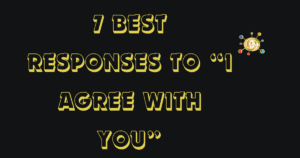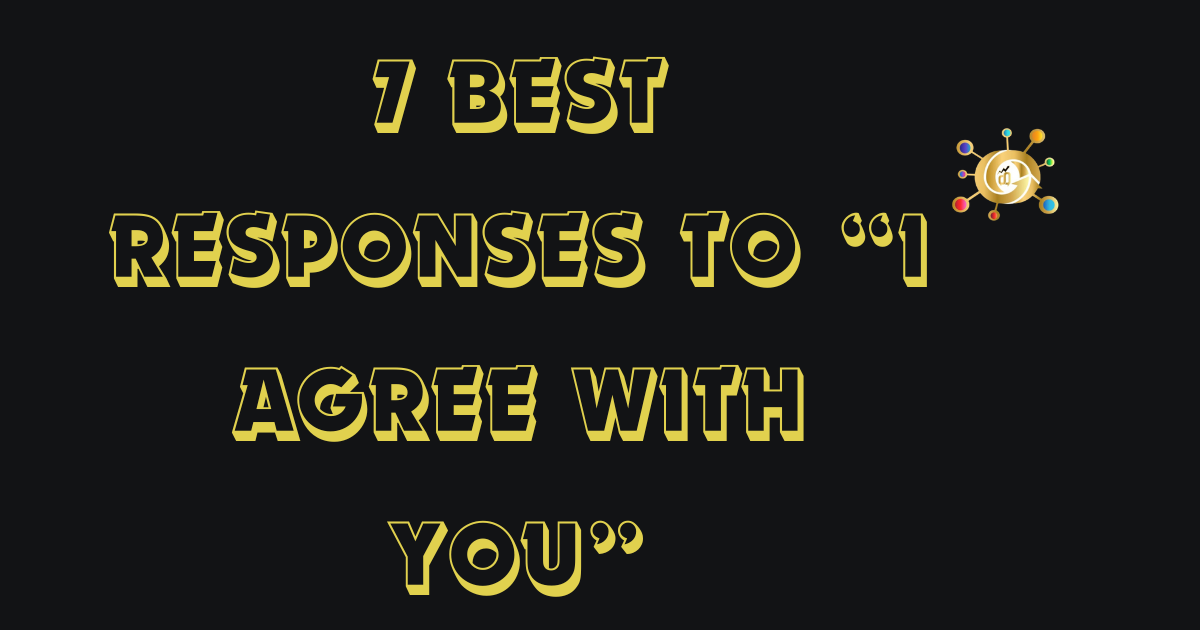7 best Responses to “I Agree With You”
Responses to “I Agree With You”
Navigating Agreement with Grace: Best Responses to “I Agree With You”
Introduction:


Agreement in conversations can be a harmonious moment, affirming shared perspectives and fostering connection. Responding to someone who says, “I agree with you” involves more than a simple acknowledgment—it’s an opportunity to deepen understanding, build rapport, and enhance the quality of communication. This article explores various strategies and considerations for crafting the best responses to such affirmations.
- Expressing Appreciation:
- A straightforward expression of gratitude sets a positive tone when met with agreement. Phrases like “Thank you for your agreement” or “I appreciate your alignment on this” convey respect for shared viewpoints.
- Affirmative Enthusiasm:
- Infuse your response with positivity by expressing enthusiasm. Statements like “Absolutely, I agree!” or “I’m thrilled we see eye to eye” communicate both agreement and excitement in the shared understanding.
- Adding Depth to Agreement:
- Take the opportunity to deepen the conversation by providing additional insights or examples related to the agreement. This enriches the discussion and encourages a more comprehensive exploration of the topic.
- Encouraging Further Discussion:
- Extend the conversation by inviting more input. Phrases such as “I’d love to hear your thoughts on this” or “What other aspects do you find interesting?” create an inclusive environment for dialogue.
- Humor and Lightness:
- Injecting humor into your response can make the exchange more enjoyable. A well-timed joke or a playful comment can add a lighthearted touch, making agreeing feel even more agreeable.
- Acknowledging Different Perspectives:
- In situations where agreement coexists with differing perspectives, acknowledge the agreement graciously and express openness to exploring diverse viewpoints. This fosters a culture of respectful dialogue.
- Expressing Gratitude:
- Beyond a simple acknowledgment, express your gratitude for the alignment of ideas. This not only reinforces a positive atmosphere but also strengthens the interpersonal connection.
- Using Emojis and Non-Verbal Cues:
- Emojis can convey emotions effectively in written communication. Adding a smiley face or a thumbs-up emoji can amplify the positive tone of your response, adding a personal touch.
- Reciprocal Agreement:
- If you genuinely agree with the other person’s perspective, reciprocate the agreement. This builds rapport and creates a sense of camaraderie, reinforcing the collaborative nature of the conversation.
- Navigating Disagreement with Respect:
- In cases where your perspective differs despite the agreement expressed, navigate the conversation respectfully. Acknowledge the deal and then diplomatically present your differing viewpoint to encourage constructive dialogue.
Responding to someone who says, “I agree with you” is an art that involves more than mere acknowledgment—it’s an opportunity to build bridges, foster collaboration, and create a positive conversational environment. Whether through expressions of gratitude, enthusiastic affirmations, or the skillful navigation of differing perspectives, these responses contribute to meaningful and productive dialogues that enhance interpersonal connections. By embracing the diversity of perspectives that agreement brings, we can cultivate mutual understanding and shared growth in our interactions.
Responding to someone who agrees with you may seem straightforward, but mastering this art can enhance communication and build stronger connections.
When someone says, “I agree with you,” it’s more than a simple affirmation; it’s a bridge connecting two perspectives.
This statement not only acknowledges shared understanding but also opens the door to collaboration and deeper conversation.
It’s a moment of unity, where ideas align and common ground is found. Responding to such agreement with gratitude, openness, and an invitation for further discussion can turn a shared viewpoint into a catalyst for positive engagement and strengthened connections.
Possible Responses to “I Agree With You”
Effective communication involves more than just agreement; it’s about building bridges, exploring nuances, and embracing a diverse array of perspectives.
By incorporating these 25 responses to “I agree with you,” conversations can evolve into more enriching and insightful exchanges.
FAQs
- Q: How should I respond when someone says, “I agree with you”?
- A: You can acknowledge their agreement by expressing appreciation or expanding on the shared sentiment.
- Q: Is it necessary to respond when someone agrees with me?
- A: While not mandatory, responding can enhance communication and strengthen the connection.
- Q: What are some polite ways to acknowledge agreement?
- A: You can say, “Thank you for your agreement,” or “I appreciate your agreement.”
- Q: How can I show enthusiasm in response to agreement?
- A: Use positive language, such as “I’m glad we’re on the same page!” or “Absolutely, I agree!”
- Q: Should I provide additional information when someone agrees with me?
- A: If relevant, you can offer more details or insights to enrich the conversation.
- Q: Can I express my gratitude for someone’s agreement?
- A: Yes, expressing gratitude is a polite and effective response. You can say, “I’m grateful for your agreement.”
- Q: Is it appropriate to ask for further thoughts after the agreement?
- A: Certainly! You can encourage more discussion by saying, “I’d love to hear more of your thoughts on this.”
- Q: What if I disagree despite someone saying, “I agree with you”?
- A: Politely acknowledge their agreement and, if necessary, express your differing perspective while maintaining respect.
- Q: Can I use humor in response to agreement?
- A: Absolutely! Humor can be a great way to lighten the conversation and build rapport.
- Q: How can I make my response more engaging?
- A: Add a personal touch by sharing anecdotes or examples reinforcing the agreement.
- Q: Is it okay to ask why someone agrees with me?
- A: Yes, asking for clarification can deepen the conversation and help you understand their perspective better.
- Q: Should I reciprocate the agreement even if I have reservations?
- A: It’s essential to be genuine, so if you have reservations, express them respectfully while acknowledging the agreement.
- Q: Can I use emojis to convey my response to agreement?
- A: Certainly! Emojis can add a friendly and expressive element to your response.
- Q: How do I navigate a situation where someone agrees but seems hesitant?
- A: Acknowledge their agreement and express openness to hearing any concerns or reservations they may have.
- Q: Is it appropriate to celebrate agreement in a professional setting?
- A: Yes, acknowledging agreement in a professional context fosters a positive and collaborative atmosphere.
- Q: How can I encourage more agreement in future discussions?
- A: Foster open communication and collaboration to create an environment where agreement is valued.
- Q: Can I use a simple “Thank you” to respond to an agreement?
- A: A straightforward “Thank you” is a polite and concise way to acknowledge agreement.
- Q: How do I gracefully handle situations where someone agrees reluctantly?
- A: Acknowledge their agreement, express understanding, and create an open space for further discussion.
- Q: Is it appropriate to express surprise when someone agrees unexpectedly?
- A: You can positively express surprise, such as “I’m pleasantly surprised by your agreement!”
- Q: Can I use agreement as an opportunity to build consensus in a group setting?
- A: Absolutely! Use agreement as a foundation to build consensus, encourage collaboration, and achieve common goals.

